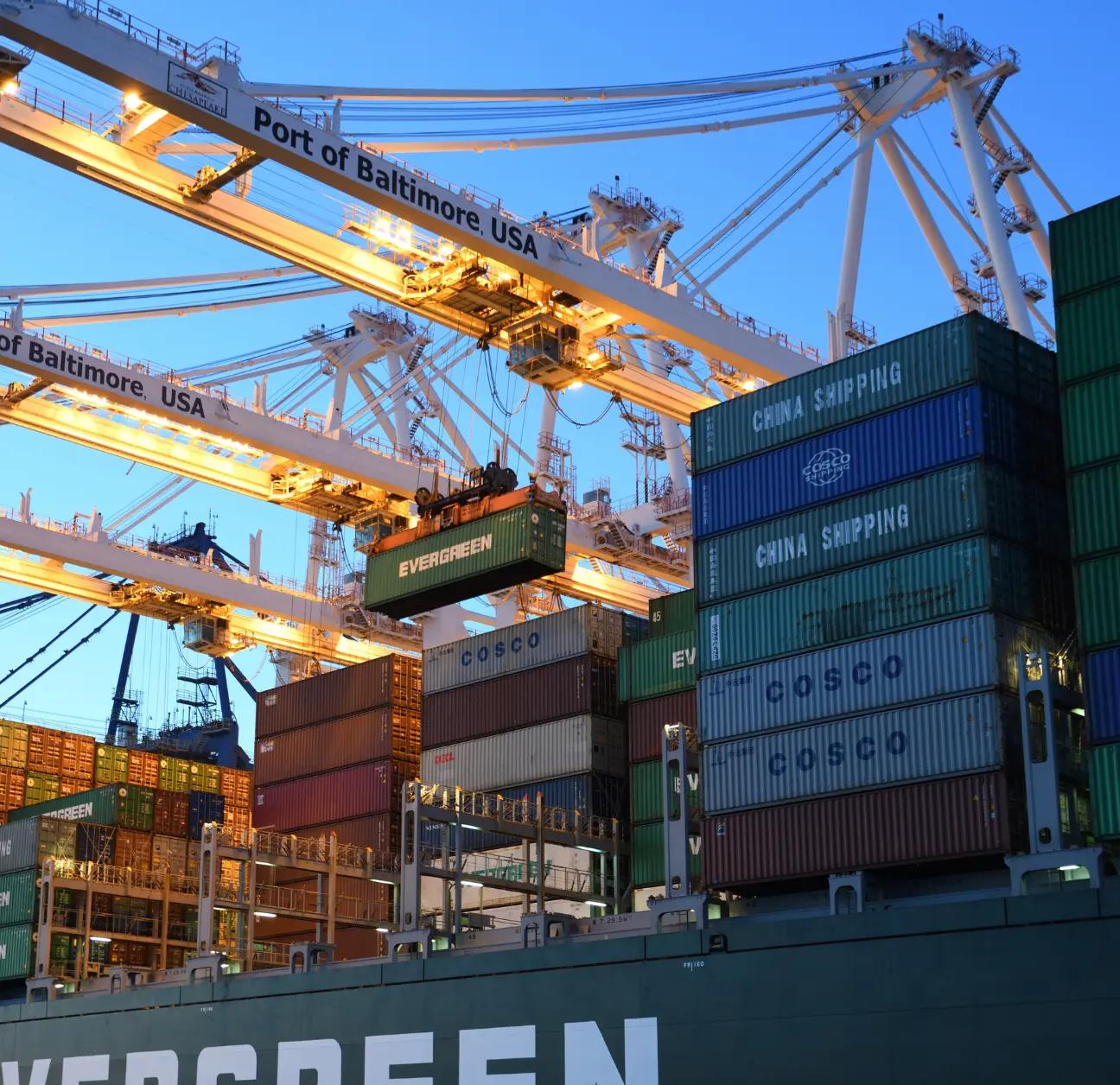New supply chain technlogy prepares your company for resilient growth at any pace, and helps you seize opportunities to scale your business, whether you’re processing ten transactions a day or 10 million.
Supply Chain Technology
As technology continues to advance at what seems to be an ever-increasing pace, markets around the globe have sought to make the most of the improving technology. Shipping enterprises, which used to rely heavily on physical documentation and record keeping (invoices, receipts, quotes, etc.), have largely undergone a kind of transformation – a supply chain digital transformation.
But what is supply chain technology? And what is a supply chain company? Supply chain technology generally refers to the information technology used in supply chain management. A supply chain company is an organization that provides one or more services necessary for the success of supply chain activities – this can include container companies, organizations that specialize in warehousing and storage, and companies that develop software to help track and manage various aspects of the supply chain industry.
From a strategic standpoint, technology is an invaluable asset to leading supply chain companies. Not only does advanced technology provide a competitive advantage, but improved technology can also enhance safety measures, ensure better customer service, and improve efficiency while increasing revenue streams.
More companies are investing in cyber-physical solutions and smart robots which can more safely tend to warehousing and distribution applications. Several organizations are also entertaining the possibility of adding driverless trucks to their shipment enterprises. Robotic implementation can increase productivity and is generally less expensive than traditional automation methods like conveyor sortation.
Before the end of the decade, many supply chain organizations will also be heavily relying on supply chain trends like artificial intelligence, machine learning, and advanced analytics to help guide important decision-making. And as supply chain logistics become ever more complicated and as market volatility increases, companies within the realm of the global supply chain will have to continue to adapt and make the most of the technology presently available. Companies that fail to make the most of the technology available to them likely won’t survive in such a competitive industry.
Supply Chain Technology Examples
The impact of technology in supply chain management could hardly be overstated. Top supply chain software companies (like Oracle, Blue Yonder, and Descartes Systems Group, for instance), now play a major role in the global shipping economy just by providing supply chain visibility software, warehouse management software, or supply chain integration software.
Supply chain technology examples may include cloud-based solutions and other cloud-tethered commerce networks, artificial intelligence, and predictive analytics, as well as advanced robotics, driverless vehicles, and even drones. Supply chain organizations also utilize internet connectivity, 5G or Starlink, as well as blockchains for supply chains. Technologies that didn’t exist ten or fifteen years ago are now commonplace and in some cases, industry standards.
A transportation management system (TMS) could also provide the necessary technology to help enable business planning and execution while optimizing inbound and outbound shipments by ensuring that shipments are compliant and that all parties have access to the relevant, necessary documentation. Technology has helped virtually every transportation management system in some regard. Those advancements are then passed onto organizations by improving the efficiency of shipping, reducing shipping costs and penalties or fines, and increasing overall customer satisfaction.
Before shippers and logistics service providers were able to integrate visibility technology into their systems, customers often had to make phone calls or send other messages to try and find out where a missing shipment was. Thanks to most modern supply chain visibility systems, customers, shippers, and carriers alike can all access shipping information from a computer or mobile device with just a few keystrokes.
The technological advancements are here to stay, or they will soon be replaced by even greater technological advancements. Companies that are able to leverage technology to the best of their ability in order to reduce costs and improve efficiency and logistics are the organizations that will continue to evolve and adapt to meet rising customer demands and expectations.
Technology in Supply Chain Management and Logistics
It’s difficult to succinctly explain how much supply chain logistics have benefited from technological advancements – technology is so pervasive now in virtually every aspect of life, and the same is true for virtually every facet of technology in the supply chain industry. It’s also difficult to ignore how technology can improve the supply chain from end to end.
The role of technology in supply chain management has evolved beyond the machinery utilized in shipping procedures; technology in supply chain management and logistics now relates to increasingly digitized aspects of the industry. Now more than ever before, supply chain organizations are utilizing real-time data to help increase visibility and productivity while minimizing the impact of disruptions. Increased visibility also enables stronger collaborative efforts and enhanced communication between vendors, shippers, and clients.
Supply chain technology companies have noticed this demand for increased efficiency and ease and have responded by developing solutions to make aspects of the supply chain process less painful and more efficient. As products and shipping requirements grow more advanced and complex, customer demands continue to increase as well as industry leaders develop better and faster shipping solutions.
And when paired with more efficient ‘smart’ warehouses, increased visibility can easily enable safer, more rapid responses when issues arise. Fewer shipments slip through the cracks, and organizations see reduced costs thanks to more robust vendor contract management. The addition of sensor technology and other tracking tools allows for better warehouse management and improved delivery logistics. Even drivers and carriers benefit from improved technology when they are able to rely on route-optimization applications.
For many supply chain companies, investing in technology, and therefore supply chain integrations, is a necessary component to the survival and longevity of the organization; some of the greatest challenges supply chain organizations face today is knowing which technological advancements they could potentially leverage more efficiently than their closest competitors.
Supply Chain Technology Trends 2022
Supply chain news in 2022 continued to trend positively. Some of the biggest supply chain technology trends 2022 saw were increased analytics and the unveiling of numerous automation advancements including a handful of next-generation robotics applications. The top supply chain organizations are no longer tethered to the sole desire of cutting operational costs; modern industry leaders that a broader approach is necessary. Technology can help in both arenas – improved tech can lower costs while organizations spend more time focusing on customer satisfaction, and making their enterprises as efficient and sustainable as possible.
Thanks to continual technological advancements, logistics, and supply chain management news this year has largely been positive, especially after seeing such tumult in previous years due to the ongoing global pandemic, labor shortages, and other international affairs complicating logistics. Expect to see more supply chain organizations investing in data analysis teams so they can better predict the future – or at the very least, increase the likelihood that they will be prepared when something unexpected occurs.
Other emerging technologies in logistics and supply chain management include the increasing affordability and practicality of 3D printing solutions, improved weighing and shipping capabilities, and more advanced and predictive analytics. One of the most revolutionary advancements in supply chain technology in the past decade has been the development of cloud technology. Thanks to cloud-based solutions, companies can centralize their data while deploying resources more effectually.
Cloud-based technology also eliminates data silos and helps boost communication between vendors, shippers, and clients. Entities and agents at virtually every level of the supply chain are able to access real-time information from the cloud and make better-informed decisions. When people are making smarter decisions at every level of the process, it’s difficult to miss the advantages.
Future of Supply Chain Management
While no one knows for sure what the future of supply chain management will hold, thanks to technological advancements, we have a pretty good idea about what to expect at least in the coming decade. Companies are continually investing in better technology and supply chain integration solutions to help optimize processes and enhance revenue streams. Companies are also investing in sustainability solutions to mitigate damage caused to the environment. These efforts and others show that the supply chain industry is here to stay as long as manufacturers and consumers are still around to make and buy goods.
The benefits of technology in supply chain management are readily evident at every level of operation – from the management and overseeing of large swaths of freight down to the very drivers and shippers making hand deliveries every day. Improved quality of life for supply chain laborers can also yield improved quality of life for vendors, managers, other clients, and customers as well. Technological advancements are generally made when an innovator is inspired to make life better or easier in some regard; the benefits that come as a result of technology rippling outward like circular waves in a still body of water. A relatively small inciting event can yield a wealth of benefits far beyond what may have been considered at the inception.
The future of supply chain technology will likely continue to advance thanks to industry innovators like Chain.io and its network of software partners that are continually discovering new ways to make supply chain management safer, more efficient, and more profitable. As more and more companies begin to enlist artificial intelligence and machine learning applications and integrate them into their systems, those companies will be able to access data about future demand and respond immediately with predictive maintenance.







